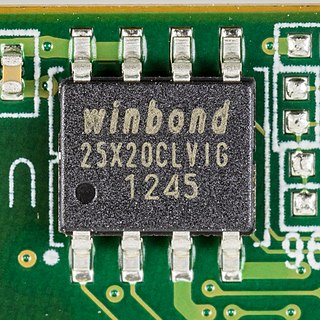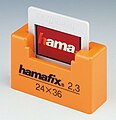
In computing, firmware is software that provides low-level control of computing device hardware. For a relatively simple device, firmware may perform all control, monitoring and data manipulation functionality. For a more complex device, firmware may provide relatively low-level control as well as hardware abstraction services to higher-level software such as an operating system.

Secure Digital, officially abbreviated as SD, is a proprietary, non-volatile, flash memory card format the SD Association (SDA) developed for use in portable devices.

A flash drive is a data storage device that includes flash memory with an integrated USB interface. A typical USB drive is removable, rewritable, and smaller than an optical disc, and usually weighs less than 30 g (1 oz). Since first offered for sale in late 2000, the storage capacities of USB drives range from 8 megabytes to 256 gigabytes (GB), 512 GB and 1 terabyte (TB). As of 2023, 2 TB flash drives were the largest currently in production. Some allow up to 100,000 write/erase cycles, depending on the exact type of memory chip used, and are thought to physically last between 10 and 100 years under normal circumstances.
iRiver, stylized IRIVER and formerly as iriver, is a South Korean consumer electronics division owned by Dreamus which markets music and other accessories in its domestic market.
Archos is a French multinational electronics company that was established in 1988 by Henri Crohas. Archos manufactures tablets, smartphones, portable media players and portable data storage devices. The name is an anagram of Crohas' last name. Also, in Greek (-αρχος), it's a suffix used in nouns indicating a person with power. The company's slogan has been updated from "Think Smaller" to "On The Go", and the current "Entertainment your way".

USB On-The-Go is a specification first used in late 2001 that allows USB devices, such as tablets or smartphones, to also act as a host, allowing other USB devices, such as USB flash drives, digital cameras, mouse or keyboards, to be attached to them. Use of USB OTG allows devices to switch back and forth between the roles of host and device. For example, a smartphone may read from removable media as the host device, but present itself as a USB Mass Storage Device when connected to a host computer.

The 3Com Ergo Audrey is a discontinued internet appliance from 3Com. It was released to the public on October 17, 2000, for USD499 as the only device in the company's "Ergo" initiative to be sold. Once connected to an appropriate provider, users could access the internet, send and receive e-mail, play audio and video, and synchronize with up to two Palm OS-based devices.

Kingston Technology Corporation is an American multinational computer technology corporation that develops, manufactures, sells and supports flash memory products, other computer-related memory products, as well as the HyperX gaming division. Headquartered in Fountain Valley, California, United States, Kingston Technology employs more than 3,000 employees worldwide as of Q1 2016. The company has manufacturing and logistics facilities in the United States, United Kingdom, Ireland, Taiwan, and China.
This table provides summary of comparison of various flash memory cards, as of 2017.

TrekStor GmbH & Co. KG is a German manufacturer of portable storage products, audio devices and tablet computers incorporated in 2001 and located in Bensheim, Germany.
The Nokia 6275i is a CDMA mobile phone. Basically, it is a "candybar" version of the Nokia 6265. It has a 2.0-megapixel camera with flash, and a portrait mirror. The phone itself has 21 MB of memory, but it can use microSD cards to expand the memory capacity to 2 GB. It uses the Nokia Series 40 OS, and can connect to other devices using infrared, USB, and Bluetooth technology. The screen has a resolution of 240x320.

Belkin International, Inc., is an American consumer electronics company headquartered in El Segundo, California. It produces mobile and computer connectivity devices and peripherals for consumer and commercial use. These include wireless chargers, power banks, charging cables, data cables, audio and video adapters, headphones, earbuds, screen protectors and cases, surge protectors, docking stations and data hubs, secure KVM switches and network cables.
Antec, Inc. is a Taiwanese manufacturer of personal computer (PC) components and consumer tech products. Antec's principal products are computer cases and power supplies. Antec also offers PC cooling products, notebook accessories, and previously offered a line of Antec Mobile Products (A.M.P.) which included Bluetooth speakers, headphones, portable batteries, and charging hubs. Originally founded in 1986 in Fremont, California, the company is now headquartered in Taipei City, with additional offices in Rotterdam, Beijing, and Fremont, California. Antec pioneered a number of innovations in the PC case industry, including the switch from beige to black exterior color, and first cases specifically designed for noise reduction with the Sonata and P180. In 2011, Antec was purchased by Ming-Jong Technologies Ltd. of Taiwan, and the combined company adopted the Antec name. Antec products are sold in over 40 countries through its online retail platform, Amazon, and distribution partners. The company is publicly traded on the Taipei stock exchange under ticker 6276.

Mobile accessories include any hardware that is not integral to the operation of a mobile smartphone as designed by the manufacturer, and adds utility to the mobile phone.

A game backup device, informally called a copier, is a device for backing up ROM data from a video game cartridge to a computer file called a ROM image and playing them back on the official hardware. Recently flash cartridges, especially on the Game Boy Advance and Nintendo DS platforms, only support the latter function; they cannot be used for backing up ROM data. Game backup devices also make it possible to develop homebrew software on video game systems. Game backup devices differ from modchips in that modchips are used in conjunction with systems that use generally available media such as CDs and DVDs, whereas game backup devices are used with systems that use cartridges.

A dock connector is an electrical connector used to attach a mobile device simultaneously to multiple external resources. Dock connectors typically carry a variety of signals and power, through a single connector, to simplify the process of docking the device. A dock connector may be embedded in a mechanical fixture used to support or align the mobile device or may be at the end of a cable.
Elecom Co., Ltd. is a Japanese electronics company and founded by Junji Hada in Osaka, Japan in 1986. The company introduced an oval mouse in 1988 that became a global standard design. They manufacture office and other furniture for using with electronics, computer peripherals, gaming peripherals, computer memory and USB flash drives, keyboards, and many other related devices.
The Toshiba TG01 is a large touchscreen phone/Mobile Internet Device. It is based on the Windows Mobile operating system and uses Qualcomm Snapdragon chip architecture (QSD8250), rated at 1 GHz. Connectivity-wise, it is a quad-band GSM phone with support for 2100 MHz UMTS with HSDPA download speeds of up to 7.2 Mbit/s and HSUPA upload speeds of up to 2 Mbit/s. It is Wi-Fi capable, GPS-enabled with support for A-GPS, and comes with Bluetooth 2.0, microSD expandable memory and a micro USB connector.

A smartbook was a class of mobile device that combined certain features of both a smartphone and netbook computer, produced between 2009 and 2010. Smartbooks were advertised with features such as always on, all-day battery life, 3G, or Wi-Fi connectivity and GPS in a laptop or tablet-style body with a screen size of 5 to 10 inches and a physical or soft touchscreen keyboard.

Chroma Cutlery(also known as Chroma Cnife, and styled CHROMA) is a kitchen knife-maker based in Demorest, Georgia, US, founded in 1989. Chroma also produces spice grinders, knife sharpening stones, kitchen shears and other cooking accessories. The company also manufactures products for other brands.

















